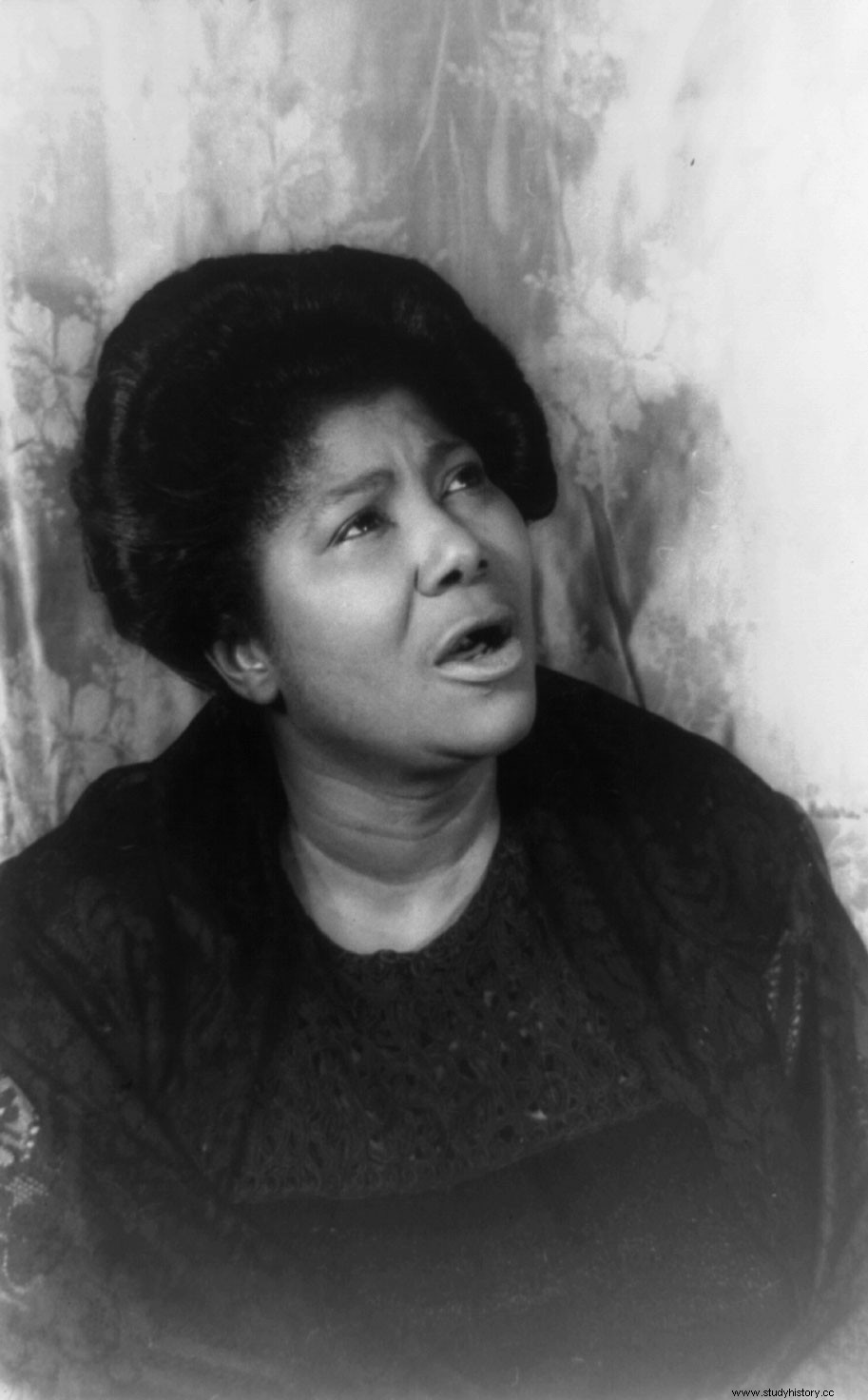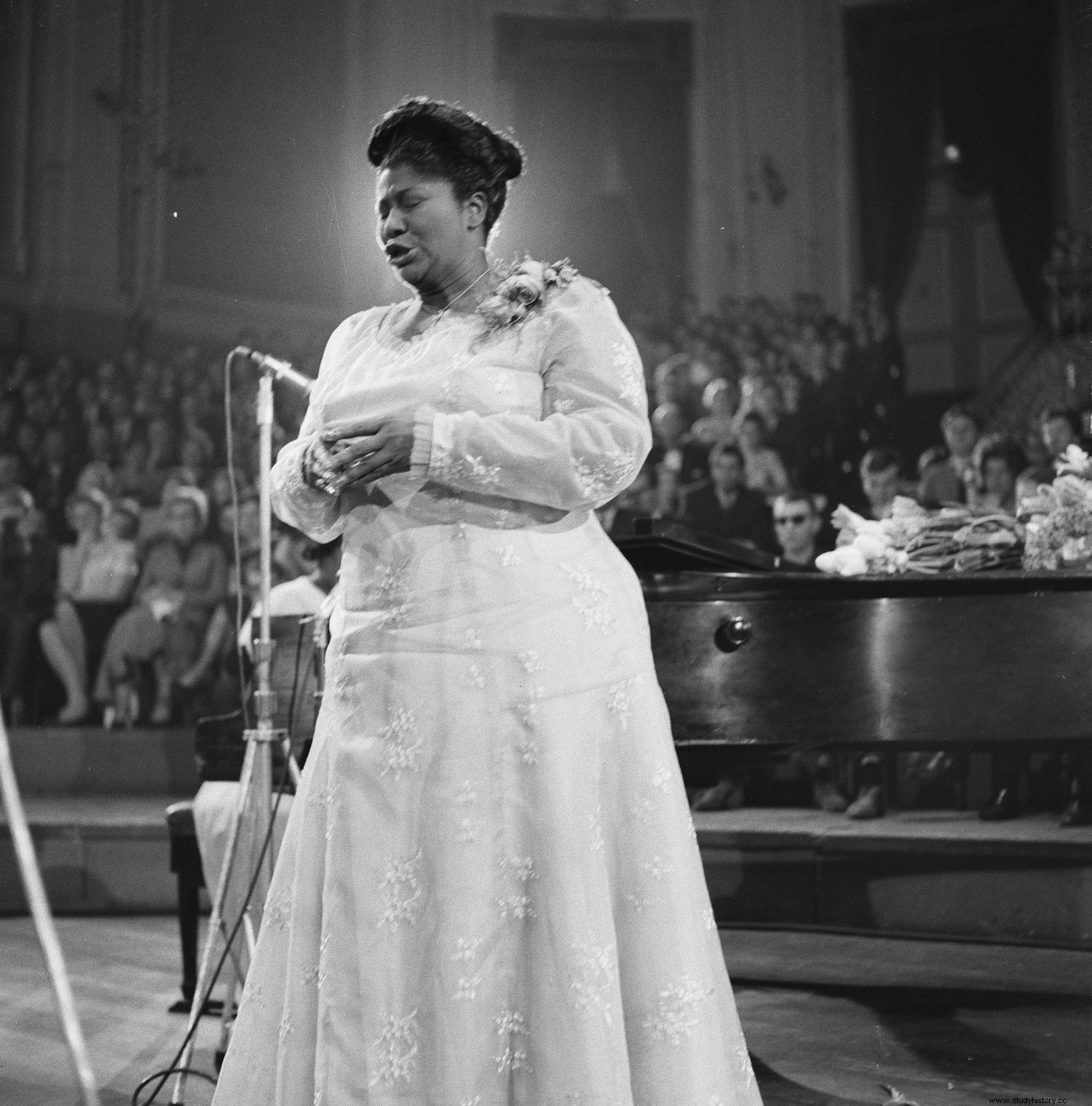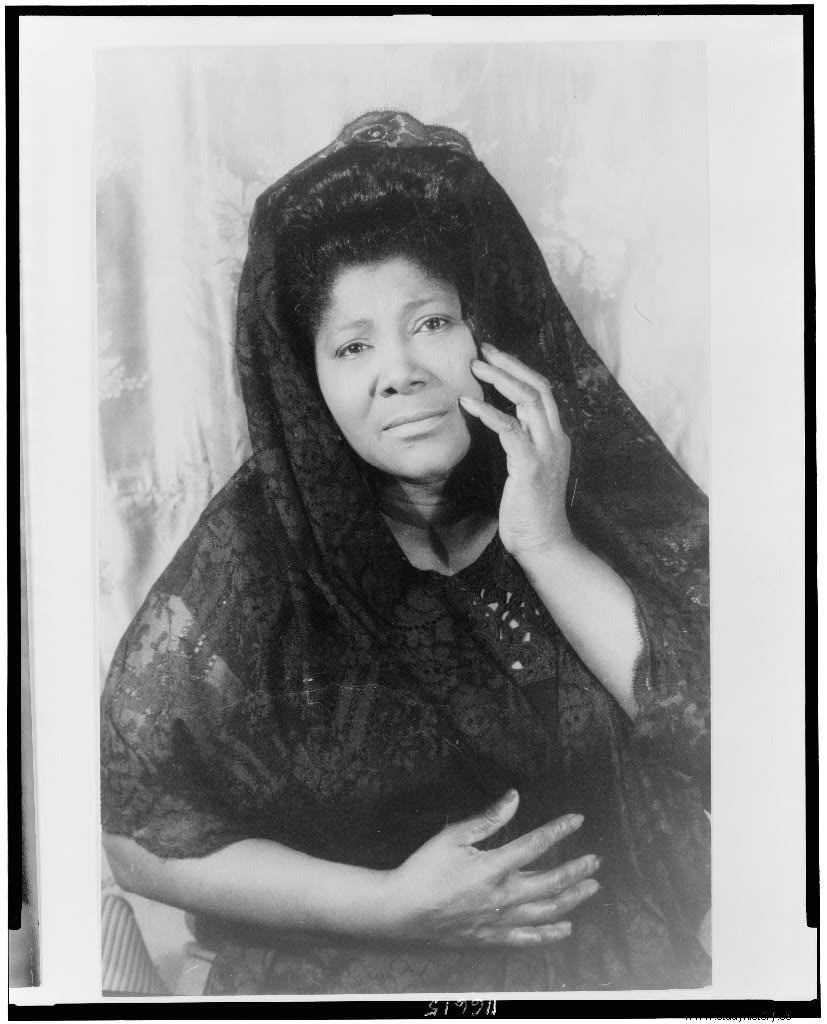American gospel singer, Mahalia Jackson (1911 – 1972) reaches the peak of her art and earns the nickname “queen of the gospel”. She is also involved in the civil rights movement.
Halie
 Mahalia Jackson was born October 26, 1911 as Mahala, like her aunt; she is quickly nicknamed Halie. The child grows up in a large household. She lives with her mother Charity Clark, a servant and laundrywoman, her brother Roosevelt Hunter, nicknamed Peter, and several aunts and cousins. Her extended family includes her mother's eight siblings, their children and grandchildren, as well as the five children Halie's father, John A. Jackson Sr, will have from a subsequent marriage.
Mahalia Jackson was born October 26, 1911 as Mahala, like her aunt; she is quickly nicknamed Halie. The child grows up in a large household. She lives with her mother Charity Clark, a servant and laundrywoman, her brother Roosevelt Hunter, nicknamed Peter, and several aunts and cousins. Her extended family includes her mother's eight siblings, their children and grandchildren, as well as the five children Halie's father, John A. Jackson Sr, will have from a subsequent marriage.
Halie was only four or five years old when her mother died. The family then decides to entrust the responsibility to his aunt Mahala, nicknamed Duke for his undisputed position at the head of the family. Duke raises the girl, and the other children, with an iron fist. Halie has to do heavy household chores or face beatings, and doesn't go to school.
"God's music"
Halie likes to sing and it is at the Baptist church that she attends, during the service, that she can give free rein to her passion. Her cousin Edward shared with her recordings of jazz and blues singers Ma Rainey, Mamie Smith and Bessie Smith. Fascinated by their singing, she practiced imitating them, but it was in church that her career as a singer began. “I sing God’s music because it makes me feel free,” she would later say, “It gives me hope. (“I sing God’s music because it makes me feel free. It gives me hope. « )
At 16, during the great African-American migration that saw six million African-Americans leave the southern United States to escape racism, Halie moved to Chicago. From the first mass she attends, after performing her favorite song "Hand Me Down My Silver Trumpet, Gabriel", she is invited to join the choir. Soon she was singing in churches in cities across the region with the Johnson Gospel Singers.
First albums
 In 1929, Halie met "the father of gospel music" Thomas A. Dorsey, who gave her advice musicals before associating with her. For 14 years, she would sing the songs he wrote at services and conventions. He notably composed the song “Take My Hand, Precious Lord“, which will be one of Halie’s classics as well as Martin Luther King Jr.’s favorite song. In 1931, she recorded “You Better Run, Run, Run”. At the same time, she decided to add an "i" to her first name and become Mahalia.
In 1929, Halie met "the father of gospel music" Thomas A. Dorsey, who gave her advice musicals before associating with her. For 14 years, she would sing the songs he wrote at services and conventions. He notably composed the song “Take My Hand, Precious Lord“, which will be one of Halie’s classics as well as Martin Luther King Jr.’s favorite song. In 1931, she recorded “You Better Run, Run, Run”. At the same time, she decided to add an "i" to her first name and become Mahalia.
In 1936, Mahalia married Isaac Lanes Gray Hockenhull. The following year, she recorded her second album. An inveterate player, her husband pressured her to sing secular music and thus earn more money, which she refused to do throughout her career. She will eventually file for divorce in 1941.
The best gospel singer in the world
In 1947, Mahalia Jackson signed a contract with the Apollo label and recorded with them a series of titles that really made her career take off. "Move On Up a Little Higher" sells eight million copies, while she sings “Precious Lord, Take My Hand” at a football stadium in Washington. She performs more often in concert halls than in churches, and is now accompanied by an orchestra rather than a piano.
In the years that followed, the titles she recorded earned her international recognition, from France to Norway via Denmark. From 1952, Mahalia toured Europe where she was acclaimed as "the best gospel singer in the world" and "an angel of peace". Although interrupted due to the exhaustion of the many concerts, the tour is a success.
In 1954, Mahalia signed a contract with Columbia Records , with whom she recorded the album The World's Greatest Gospel Singer , then Sweet Little Jesus Boy and Bless This House in 1956. She met with such success that she was in demand everywhere:she opened festivals and sang at the inaugural ball of John F. Kennedy.
The March on Washington
 Mahalia Jackson is involved in the civil rights movement. In 1956, at the request of Martin Luther King and despite the death threats she received, she sang in Montgomery to raise funds in support of the bus boycott movement. Her fame does not protect her from racism; when she wants to buy a house in Chicago, shots are fired at her window and white families move out.
Mahalia Jackson is involved in the civil rights movement. In 1956, at the request of Martin Luther King and despite the death threats she received, she sang in Montgomery to raise funds in support of the bus boycott movement. Her fame does not protect her from racism; when she wants to buy a house in Chicago, shots are fired at her window and white families move out.
In support of the civil rights movement, Mahalia participated and sang at the March on Washington for Jobs and Freedom. During Martin Luther King's speech, she says "Tell them about the dream, Martin!" (Tell them about the dream, Martin!) . The pastor then utters his famous “I Have A Dream” . Five years later, she would sing Martin Luther King's favorite song, "Take My Hand, Precious Lord" , at his funeral.
Hoping with his music to “break down some of the hate and fear that divide the white and black people in this country” ) , Mahalia also supports the movement financially.
End of career
In 1969, Mahalia Jackson recorded her last album, What The World Needs Now . Two years later, she put an end to her career and, with a few exceptions, to her public appearances, during a concert in Germany. On her return to the United States, she devoted herself to the creation of her charitable foundation, the Mahalia Jackson Scholarship Foundation , which works to help young people continue their studies. Faithful to Chicago until the end of her life, she will also open a beauty salon and a florist shop.
Mahalia Jackson died in January 1972 in Chicago. The cities of Chicago and New Orleans both pay him great homage, and tens of thousands of people march through the streets. Big names, including Ella Fitzgerald and Aretha Franklin pay tribute to him.
